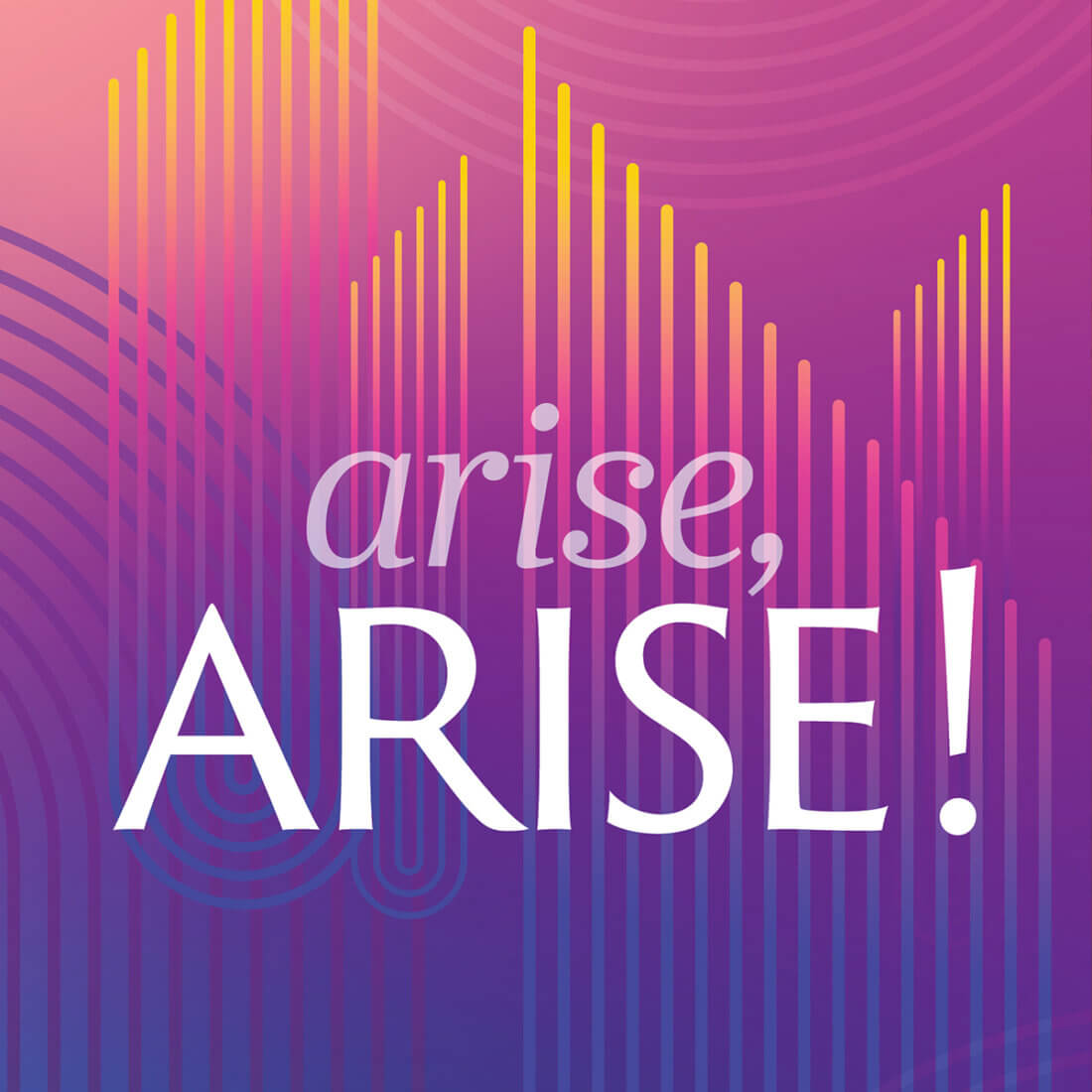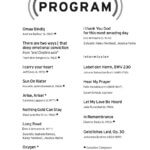Chronos presents: Arise, Arise!
joy and sorrow, gratitude and protest, reflection, awe, and wonder
This concert embraces the full range of human experience, celebrating the universal humanity expressed in the choral tradition across history and place. Encompassing joy and lament, gratitude and protest, reflection, awe, and wonder; ARISE, Arise! presents brand new music by Stuart Beatch and Chronos Composition Competition winner Carmine Lappano, paired with foundational choral works by Bach and Mendelssohn.
Extended Program Notes
Omaa Bindig
Andrew Balfour (b. 1967)
Part of a recent album project called Nagamo, by musica intima (Vancouver) featuring the music of Andrew Balfour, Omaa Bindig is a reworking, with new text of an older work Balfour composed in 2003 on a latin text.
Andrew describes the project as follows:
“… As a 60’s scooper, I was taken away from my Indigenous family when I was a baby, but luckily was raised in a loving and very musical family. I have spent most of my life trying to identify my Indigenous blood, culture and language. Through my composing and collaboration with Indigenous and non-Indigenous artists it has been a beautiful Ispiciwin (journey)… By taking choral music of the Elizabethan masters and other later choral music, I have reshaped the thoughts behind the texts, by changing the Latin to Ojibway or Cree perspectives. These are not direct translations of the sacred texts, rather a more Indigenous perspective of spirituality, but keeping the beauty of the polyphony intact… I’d like to think this is only the first step of many more towards a deeper understanding of Indigenous healing and artistic perspectives on Mother Earth now, and in the future.”
Sun On Water
Hussein Janmohamed (b. 1969)
Toronto-based composer Hussein Janmohamed draws upon the varied components of his cultural heritage and personal musical experience in composing; The texts and musical influences for Sun on Water come from Western choral music, Middle Eastern rhythms, and Hindu and Indic Ismaili Muslim traditions.
The composer writes:
“Sun on Water originated while living at Fool’s Paradise – Canadian artist Doris McCarthy’s home and studio – through the Doris McCarthy Artist in Residence Program of the Ontario Heritage Trust. Sun on Water finds its inspiration in the mystery of winter sunrises on Toronto’s Scarborough Bluffs. The colours of the rising sun over Lake Ontario revealed a palpable silence and yearning from which the music emerged. The piece, written specially for Toronto’s Amadeus Choir, is for a cappella choir and optional Tibetan singing bowl. The texts and musical influences come from Western choral music, Middle Eastern rhythms, Hindu and Indic Ismaili Muslim traditions. Sun on Water begins quietly as deep waters rumble underneath. Sonic layers reflect the yearning of the sun and water, like lover and beloved, for each other. A burst of sun breaks forth. Yet, as the sun’s rays shimmer on the surface of the lake, the deep water still echoes their mutual yearning for ultimate union.”
Arise, Arise!
Carmine Lappano (b.1977)
From the composer:
“The text comes from a collection of poems by James Joyce, published by Elkin Mathews in 1907. As I came across this poem, looking for something to set to music, I knew I had found something very special. Considering that most (if not all) of this set of poems were love poems, this particular one seems to be of a love from a brother who has lost his sister (or a sister that lost her sister). I can see him at her grave thinking these words from the text. Perhaps on a beautiful evening in the spring, at dusk, the brother finds himself in grief as he asks his sister to arise and return to him. Alas, he knows these words are only for himself to hear, as he continues to grieve the loss. Joyce paints a picture around him that is quite lovely, with odorous winds and night-dew fields. Musically, I wanted to try to capture the pain he was feeling, but in an understated manner. The beginning of the piece has a theme that returns two times (“Arise my dove”). As he pleads for his sister to “arise”, you can feel the music growing in intensity, as if he is not being heard. Then in the verses, the music resigns to something a bit more pensive and calm. My endeavour was to create vocal lines that reflect the text well, and that would suit [the choir’s] wonderful voices.”
Long Road
Eriks Ešenvalds (b. 1977)
From the composer:
“When composing a work, I give myself to the temptation of the creative work — a journey, whose twisting roads persistently, but convincingly, bring me to the final sounds of the score. Only then do I exhale.”
Long Road sets a love poem by Paulina Barda (1890-1983), the widow of Latvian pantheistic nature poet Fricis Barda (1880-1919). References to nature reflect the personality of the longed-for departed one, as seen in the memory of his widow. Grief mixes with pleasurable memories, as reflected in the text “my heart both cries and laughs.” The composer employs double-choir scoring for portions of the piece, with one group singing text while another hums, expanding the harmonic palette. Two “descant” voices in octaves perhaps represent the two lovers, parted yet united through memory.
Our performance today employs the English version released by the composer subsequent to the original setting in Latvian.
Oxygen
Stuart Beatch (b. 1991)
From the composer:
“I’m thrilled to be writing a major new work for Chronos’s 10th anniversary! Chosen Family [will be] a set of four songs adapting poetry by Victoria-based poet John Barton. Each poem memorializes an important person from Barton’s life, and together, they tell a narrative of coping with loss through the support of our chosen families. This term is especially significant to the queer community (Barton being one of Canada’s seminal gay poets), but for me, it also describes Chronos. These songs will feature some big, lush music that Chronos does best, and it will be my pleasure to sing with them in the premiere…”
“Oxygen tells the story of John visiting his favourite aunt Barbara in hospital for the last time before her passing in 2016. The poem focuses on the joy of their final moments together, reflecting on her character and her passion for flowers. My music aims to celebrate her memory, contrasting lush harmonies with moments of stillness and reflection.”
Lobet den Herrn, BWV 230
Johann Sebastian Bach (1685-1750)
While several of Bach’s other motets were composed for funerals of prominent parishioners, Lobet den Herrn seems to have been written for a more celebratory occasion. This factor, and various other differences between it and the other known Bach motets (including its rather short length, four-voice scoring throughout, and independent instrumental accompaniment) have led certain scholars to doubt its authenticity. However, for the experienced singer of his vocal music, the work certainly feels like J.S. Bach.
Following an exuberant opening section, the music continues with a joyful melismatic theme on the word “preiset” (give praise), culminating in a joining of voices on “alle Völker” (all peoples). Following a more subdued “denn seine Gnade und Wahrheit” section featuring long pedal tones on the word “ewigkeit” (eternity), the motet concludes with an exuberant Alleluia, replete with fleeting moments of spicy dissonance and delightful sequences of imitative syncopations.
Hear My Prayer
Felix Mendelssohn (1809-1847)
From a program note by Silas Wollston:
“Initially, [librettist William] Bartholomew had aspirations to be Mendelssohn’s opera librettist, but all the texts he sent were declined by the composer. However, Bartholomew’s extraordinary skill as a translator, evidenced by his English version of Spohr’s opera Jessonda, did attract Mendelssohn’s attention; a relationship of mutual respect developed between the two men and Bartholomew created English versions of many works by Mendelssohn. In agreeing to compose ‘Hear my prayer’ Mendelssohn fulfilled Bartholomew’s greatest wish – to have his own poetry set to the music of his dear friend. The text of this ‘sacred solo’ is Bartholomew’s own paraphrase of verses from Psalm 55.
The first performance took place on 8 January 1845 in the medieval Great Hall of Crosby Hall… Ann Mounsey played the organ accompaniment… and the soprano solo was sung by Elizabeth Rainforth, a well-known stage singer… The modern-day popularity of the work stems from the recording made in 1927 by boy treble Ernest Lough which became EMI’s first million-selling classical recording.”
Let My Love Be Heard
Jake Runestad (b. 1984)
From the composer:
“Though originally written for Choral Arts Northwest, this work [took on] new life in light of the atrocities in Paris and Beirut. Jonathan Talberg, the conductor of the choir at Cal State Long Beach, led his singers in a performance during the memorial vigil for Nohemi Gonzalez, a Long Beach student who was killed in the Paris attacks. The day after the vigil.. he passed out [Let My Love Be Heard], rehearsed it, and then recorded it. It was posted on SoundCloud and shared in memory of Nohemi and as a plea for peace. Their musical offering is a powerful outpouring of grief but also a glimmer of light. I am honored that Let My Love Be Heard has helped to provide hope in the darkness of our world.”
Geistliches Leid, Op. 30
Johannes Brahms (1833-1897)
This composition, in the form of a double canon, was written as part of an exchange of contrapuntal exercises between Brahms and the violinist Joseph Joachim. Interestingly, though Joachim generally approved, he first wrote of Brahms’s work,
“But there are many harsh places! For example, in the Amen in question, the tenor, which is beautiful in and of itself, clashes all too harshly with the alto and soprano at the place marked… Your ear is so used to rough harmonies, of such polyphonic texture, that you rarely consider the voices just in their mutual clashing… But you cannot ask that of the listener, even the most musical; and since all art is meant to inspire collective delight, since that is its holiest virtue, I beg you to think about that.”
For the modern listener, the described dissonances, while somewhat unique for Brahms, are by no means displeasing, and the work is a special one within his choral oeuvre, with the Amen being particularly magnificent.

